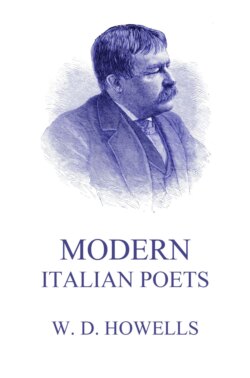Читать книгу Modern Italian Poets - William Dean Howells - Страница 7
На сайте Литреса книга снята с продажи.
IV
ОглавлениеIn dealing with this poetry, I naturally seek to give its universal and aesthetic flavor wherever it is separable from its political quality; for I should not hope to interest any one else in what I had myself often found very tiresome. I suspect, indeed, that political satire and invective are not relished best in free countries. No danger attends their exercise; there is none of the charm of secrecy or the pleasure of transgression in their production; there is no special poignancy to free administrations in any one of ten thousand assaults upon them; the poets leave this sort of thing mostly to the newspapers. Besides, we have not, so to speak, the grounds that such a long-struggling people as the Italians had for the enjoyment of patriotic poetry. As an average American, I have found myself very greatly embarrassed when required, by Count Alfieri, for example, to hate tyrants. Of course I do hate them in a general sort of way; but having never seen one, how is it possible for me to feel any personal fury toward them? When the later Italian poets ask me to loathe spies and priests I am equally at a loss. I can hardly form the idea of a spy, of an agent of the police, paid to haunt the steps of honest men, to overhear their speech, and, if possible, entrap them into a political offense. As to priests—well, yes, I suppose they are bad, though I do not know this from experience; and I find them generally upon acquaintance very amiable. But all this was different with the Italians: they had known, seen, and felt tyrants, both foreign and domestic, of every kind; spies and informers had helped to make their restricted lives anxious and insecure; and priests had leagued themselves with the police and the oppressors until the Church, which should have been kept a sacred refuge from all the sorrows and wrongs of the world, became the most dreadful of its prisons. It is no wonder that the literature of these people should have been so filled with the patriotic passion of their life; and I am not sure that literature is not as nobly employed in exciting men to heroism and martyrdom for a great cause as in the purveyance of mere intellectual delights. What it was in Italy when it made this its chief business we may best learn from an inquiry that I have at last found somewhat amusing. It will lead us over vast meadows of green baize enameled with artificial flowers, among streams that do nothing but purl. In this region the shadows are mostly brown, and the mountains are invariably horrid; there are tumbling floods and sighing groves; there are naturally nymphs and swains; and the chief business of life is to be in love and not to be in love; to burn and to freeze without regard to the mercury. Need I say that this region is Arcady?
